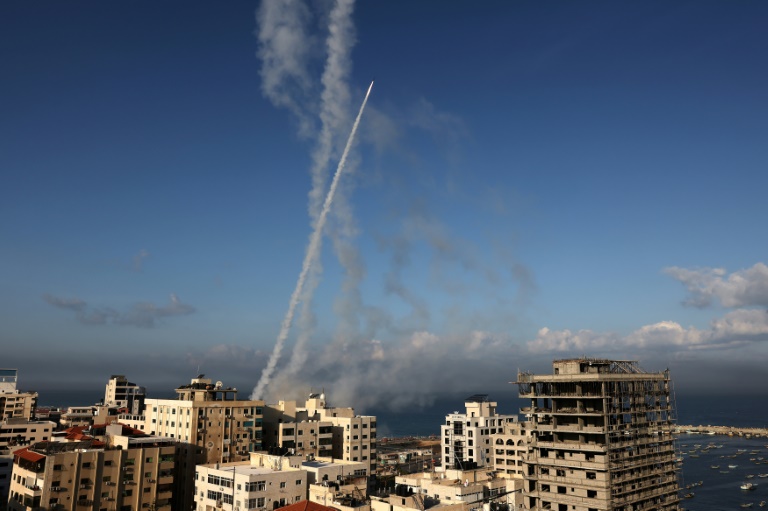IS under pressure after Hamas attack on Israel

Rockets are fired from Gaza City towards Israel on October 7, 2023.
Paris – The deadly Hamas attack on Israel may have taken the limelight from the Islamic State group, but the jihadists are seeking to capitalise on anger over the bombardment of Gaza to rally followers, analysts say.
Israel has vowed to defeat Hamas after an attack on its soil by the Palestinian militant group on October 7 that killed around 1,140 people, mostly civilians, according to an AFP tally based on official figures.
Militants also took around 250 hostages, 132 of whom Israel says remain in Gaza, including at least 25 believed to have been killed.
The war has put the spotlight on Hamas.
“Without the Gaza war, IS would get the headlines,” said Hans-Jakob Schindler, director of the Counter Extremism Project think tank.
“It puts considerable pressure on IS to remain relevant.”
Both groups are described as “terrorist” by Israel and the West, but they have very different agendas.
Hamas, which is backed by the Shiite Islamic republic of Iran, presents itself as defending the Palestinian people against the Israeli occupation since 1948.
Staunchly Sunni, IS is against Iran and focused on trying to revive its project of a global Islamic caliphate, after losing the territory it held in Syria and Iraq between 2014 and 2019.
– ‘Several fronts’ –
But its supporters are also against Israel and any “global Jewish project”, said Laurence Bindner, co-founder of the JOS Project, which analyses extremist propaganda.
“In the Middle East, the enemy of my enemy is not necessarily my friend,” she told AFP.
IS “has positioned itself simultaneously on several fronts: one against Jews and those who support Israel and another against Iran and their allies”.
Earlier this month, IS claimed an attack in Iran that killed 89 people gathered to commemorate the fourth anniversary of the killing of storied Revolutionary Guards general Qasem Soleimani in a US drone strike.
Since the start of the war in Gaza, IS has sought to tap into sympathy for Palestinians.
Israel has responded to the October 7 attacks with a relentless military campaign in Gaza, killing more than 23,000 people, mostly women and children, according to the health ministry in the Hamas-ruled besieged territory.
Late October, IS in its Al-Naba propaganda magazine published a text on “Practical Ways to Support Muslims in Palestine”, urging followers to attack Israel, its Western backers and all Jews worldwide.
Earlier this month, the jihadist group’s spokesperson, Abu Hudhayfah Al-Ansari, posted a recording titled “And kill them wherever you find them”.
– ‘Opportunity’ –
IS has “identified an opportunity to leverage the hostile anti-Israel sentiments throughout the Muslim world over the aerial bombardment and military invasion of Gaza,” said Lucas Webber, co-founder of the Militant Wire website.
“It’s an opening for increased relevance and success,” he told AFP.
“Even as IS continues to have a particular disdain for Hamas, it does not mean that the jihadists will forgo taking advantage of the fighting for their own purpose — pushing supporters to strike in the West, nudging fence-sitters toward action, and aiming to radicalize a growing pool of angry individuals.”
There has been some IS-related activity in Europe in recent months, although only at a low level.
In France, a French national born to Iranian parents who had sworn allegiance to IS stabbed a German-Filipino tourist to death in Paris in early December.
Italian police said in November they had arrested an Algerian man in the Milan subway, later discovering he was wanted by Algeria since 2015 for alleged ties to IS.
A bigger operation “would be necessary” for the jihadist group in Europe for more people to talk about them, Schindler told AFP.
“They have put networks in place for a long time already. Now they really need to do something so they can put themselves back on the agenda”.
Eva Koulouriotis, an independent Middle East expert, said IS was currently focused on building support in the Middle East and Central Africa.
They want to “achieve greater popularity within Islamic societies and, consequently, attract more members,” she said.
